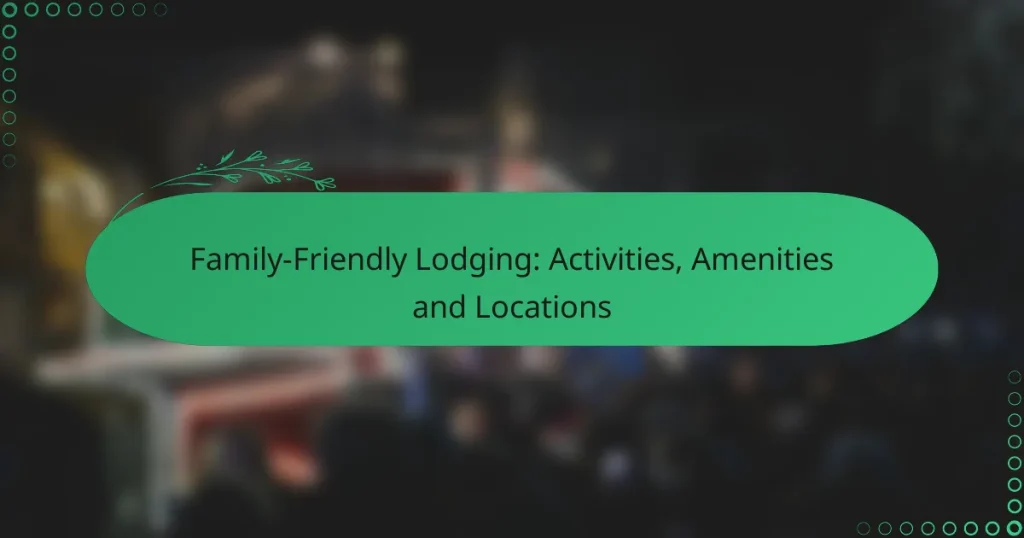When planning a brief stay, selecting the right type of one-night accommodation is essential for a comfortable experience. In New Zealand, options such as hotels, motels, hostels, bed and breakfasts, and short-term rentals cater to diverse preferences and budgets. By considering factors like location and guest feedback, travelers can find the perfect lodging to suit their needs.
Pet-Friendly One-Night Stays: Booking Options, Amenities and Policies
Family-Friendly Lodging: Activities, Amenities and Locations
Eco-Friendly Accommodation: Sustainability, Features and Options
Budget-Friendly Hostels: Amenities, Locations and Prices
Luxury One-Night Stays: Top Resorts, Amenities and Experiences
Unique Accommodation: Glamping, Features and Locations
What are the best types of one-night accommodations in New Zealand?
The best types of one-night accommodations in New Zealand include hotels, motels, hostels, bed and breakfasts, and short-term rentals. Each option offers unique benefits and caters to different preferences and budgets, making it easier to find suitable lodging for a brief stay.
Hotels
Hotels in New Zealand range from luxury establishments to budget-friendly options, providing a variety of amenities such as room service, pools, and fitness centers. Major cities like Auckland and Wellington feature well-known chains, while smaller towns may offer charming boutique hotels.
When choosing a hotel, consider factors like location, price, and guest reviews. Booking in advance can often secure better rates, especially during peak tourist seasons.
Motels
Motels are a popular choice for travelers seeking convenience and affordability. Typically located near highways or tourist attractions, they offer easy access for one-night stays. Most motels provide basic amenities like kitchenettes and parking.
In New Zealand, motels are often family-owned, which can lead to a more personalized experience. Look for motels that offer special deals or packages, especially during off-peak times.
Hostels
Hostels are ideal for budget-conscious travelers and those looking to meet new people. They often feature shared dormitory-style accommodations, as well as private rooms at a lower cost than hotels. Many hostels provide communal kitchens and social areas.
In New Zealand, hostels can be found in major cities and popular tourist destinations. Booking in advance is recommended, especially during busy seasons, to secure a spot in your preferred location.
Bed and Breakfasts
Bed and breakfasts (B&Bs) offer a cozy, home-like atmosphere with personalized service. Typically run by local hosts, B&Bs often include breakfast in the room rate, showcasing local ingredients and specialties.
Staying at a B&B in New Zealand can provide unique insights into local culture and attractions. Look for B&Bs with good reviews and check for any special offers or packages that may enhance your stay.
Short-term Rentals
Short-term rentals, such as those found on platforms like Airbnb, provide a home-away-from-home experience. These accommodations can range from entire homes to private rooms, often allowing for more space and amenities than traditional hotels.
When booking a short-term rental in New Zealand, consider the location, size, and amenities offered. Always read reviews and check the cancellation policy to avoid any surprises during your stay.
How to choose the right one-night accommodation?
Choosing the right one-night accommodation involves assessing your specific needs, including location, budget, and guest feedback. Prioritize what matters most to you, whether it’s proximity to attractions or the overall cost.
Location considerations
Location is crucial when selecting one-night accommodations. Consider how close the lodging is to your destination, such as airports, train stations, or tourist attractions. A central location can save you time and transportation costs.
Additionally, think about the safety and amenities of the neighborhood. Areas with restaurants, shops, and public transport options can enhance your stay, making it more convenient and enjoyable.
Price range
The price range for one-night accommodations can vary widely based on factors like location, type of lodging, and time of year. Budget options may start from around $50 to $100, while mid-range hotels typically fall between $100 and $200 per night.
Luxury accommodations can exceed $200, especially in prime locations. Always check for additional fees, such as taxes or resort fees, to ensure you stay within your budget.
Guest reviews
Guest reviews are a valuable resource when selecting one-night accommodations. Look for feedback on cleanliness, service quality, and overall experience. Websites like TripAdvisor or Booking.com can provide insights from previous guests.
Pay attention to recent reviews, as they reflect the current state of the accommodation. A few negative reviews can be normal, but consistent complaints about specific issues should raise red flags.
What are the benefits of staying in hotels?
Staying in hotels offers numerous advantages, including comfort, convenience, and a range of amenities that enhance the travel experience. Hotels provide a reliable option for accommodation, often with services that cater to various needs and preferences.
Convenience and amenities
Hotels are designed for convenience, often located near airports, business districts, or tourist attractions. This strategic positioning allows guests to easily access key locations without extensive travel time.
Many hotels offer a variety of amenities such as free Wi-Fi, on-site dining, fitness centers, and pools. These features can significantly enhance the overall experience, making it easier for guests to relax and enjoy their stay.
Service quality
Service quality in hotels can vary, but many establishments prioritize customer satisfaction. Staff are typically trained to provide assistance and address any issues promptly, ensuring a pleasant experience for guests.
Higher-end hotels often offer personalized services, such as concierge assistance or room service, which can elevate the stay. It’s advisable to read reviews and check ratings to gauge the service quality before booking a hotel.
What should I know about motels in New Zealand?
Motels in New Zealand offer budget-friendly lodging options, typically featuring self-contained units with essential amenities. They are popular among travelers seeking convenience and affordability, often located near key attractions and transport hubs.
Affordability
Motels in New Zealand are generally more affordable than hotels, with prices often ranging from NZD 100 to NZD 200 per night, depending on location and season. Many motels provide kitchen facilities, allowing guests to save on dining costs by preparing their own meals.
When booking, consider looking for deals or discounts, especially during off-peak seasons. Some motels may offer loyalty programs or package deals that can further reduce expenses.
Accessibility
Most motels in New Zealand are designed for easy access, often featuring ground-floor units and parking close to the rooms. This makes them a suitable choice for travelers with mobility challenges or those carrying heavy luggage.
Check for specific accessibility features, such as ramps or accessible bathrooms, when making reservations. It’s advisable to contact the motel directly to confirm these details and ensure a comfortable stay.
How do hostels cater to budget travelers?
Hostels provide affordable lodging options for budget travelers by offering shared facilities and lower rates compared to hotels. They typically feature dormitory-style rooms, communal kitchens, and social spaces, making them ideal for those looking to save money while meeting other travelers.
Shared accommodations
Shared accommodations in hostels usually consist of dormitory rooms with multiple beds, allowing guests to book a single bed rather than an entire room. Prices for these beds can range from low tens of USD to around fifty USD per night, depending on the location and season. This setup not only reduces costs but also fosters a sense of community among guests.
Some hostels offer private rooms as well, which can be a good compromise for couples or friends traveling together. These private options are generally more expensive but still tend to be cheaper than hotel rates.
Social atmosphere
The social atmosphere in hostels is one of their main attractions, as they often host events like group dinners, game nights, or city tours. This encourages interaction among guests, making it easier to meet new people and share travel experiences. Many hostels also have common areas where guests can relax and socialize, enhancing the communal vibe.
For those who enjoy meeting fellow travelers, choosing a hostel with a vibrant social scene can significantly enrich the travel experience. However, if you prefer a quieter stay, look for hostels that offer a more relaxed environment or private rooms to balance social engagement with personal space.






